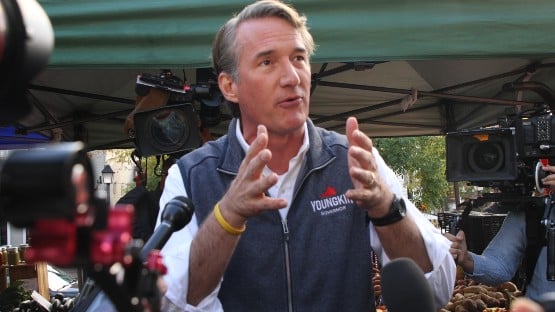
Gov. Glenn Youngkin is, again, playing politics with K-12 education, claiming today that declining test scores for fourth- and eighth-graders in Virginia are the result of education standards lowered under his Democratic predecessors.
The lower scores are, in fact, a national, bipartisan phenomenon, with the 2022 National Assessment of Educational Progress, released on Monday, showing sharp declines across the country, reflecting the effect of COVID-19 school closures.
“The results show the profound toll on student learning during the pandemic, as the size and scope of the declines are the largest ever in mathematics,” said Peggy G. Carr, commissioner of the National Center for Education Statistics. “The results also underscore the importance of instruction and the role of schools in both students’ academic growth and their overall wellbeing. It’s clear we all need to come together – policymakers and community leaders at every level – as partners in helping our educators, children, and families succeed.”
So, the lower scores are a predictable effect of the pandemic, except to Youngkin, who rode generated political controversy over the teaching of “divisive concepts” to victory in last year’s governor’s race, and has followed through on promises to whitewash K-12 instruction in his first year in office, and wants to make everything here the Democrats’ fault.
“The NAEP results are another loud wake-up call: our nation’s children have experienced catastrophic learning loss, and Virginia’s students are among the hardest hit,” Youngkin said. “Every parent in Virginia is now acutely aware that when my predecessors lowered educational standards, those lowered expectations were met. Virginia’s children bear the brunt of these misguided decisions.
“These actions were compounded by keeping children out of school for extended and unnecessary periods. Virginia may lose a generation of children – particularly among our most in need,” Youngkin said. “We are redoubling our Commitment to Virginians, to prevent us from losing a generation, with additional steps to ensure that all children in Virginia have the tools and support structure to get back on track.”
Schools across the country were forced to close for in-person instruction at the start of the COVID-19 pandemic in March 2020, and many remained in virtual-only mode through the end of the 2020-2021 school year, as vaccines began to get into wider circulation.
Many students struggled with the switch from classroom to online learning.
The average math score was down nationally five points for fourth-graders from the 2019 NAEP, the last full school year before the pandemic, and eight points below the 2019 mark for eighth-graders.
The reading scores were down three points for fourth-graders and eighth-graders from the 2019 numbers.
In Virginia, the average reading scores were down 10 points for fourth-graders and two points for eighth-graders, and math scores were down 11 points for fourth-graders and eight points for eighth-graders.
The declining test scores in Virginia are not entirely the result of “lowered expectations,” as Youngkin is claiming, but actually longer-term, and again, bipartisan, neglect of K-12 education from a money perspective.
The Commitment to Virginians that Youngkin referenced today, significantly, does not address the state funding gap. The only money referenced in the seven-point plan is federal money, effectively kicking the can up I-95 to D.C. to solve the problem.
“Virginia has not been fully funding its schools for many years, and that impacts the ability for schools to make sure every student can thrive,” Laura Goren, director of research and education policy at The Commonwealth Institute, told WTVR-TV6.










